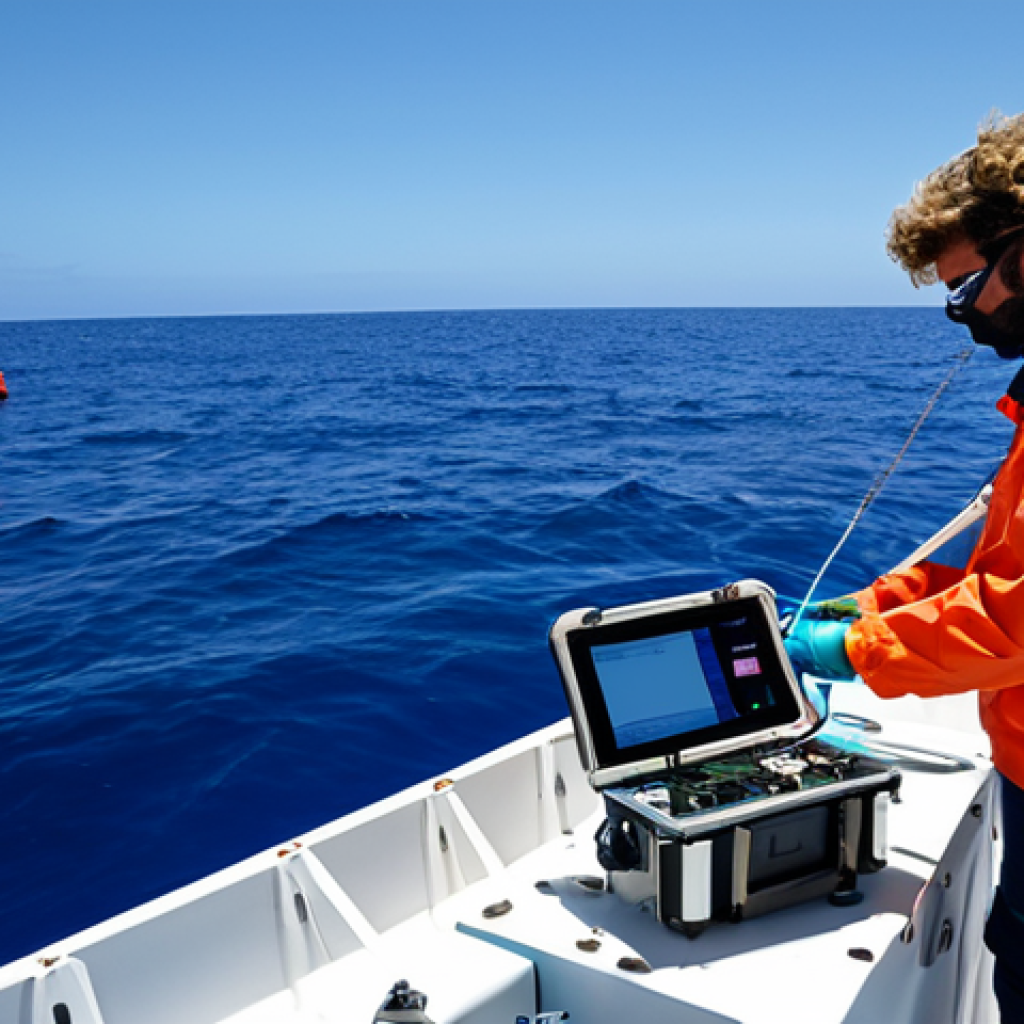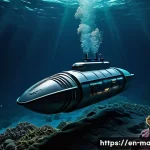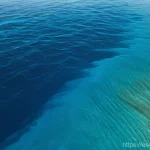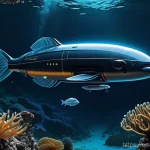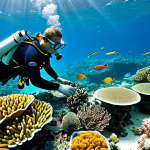The ocean, a vast and largely unexplored realm, holds secrets and challenges that transcend national borders. From climate change impacts to resource management and biodiversity conservation, tackling these issues demands a united front.
International collaboration in oceanography isn’t just a nice-to-have; it’s absolutely essential for sustainable ocean stewardship. Think of it like this: one country’s actions can have ripple effects across the entire ocean ecosystem, impacting everyone.
It’s about sharing knowledge, resources, and expertise to understand and protect our shared marine environment. The future of our oceans depends on it.
Let’s dive deeper into the topic in the article below.
## Navigating the Complexities: Why Global Cooperation is KeyThe ocean doesn’t recognize lines on a map. Pollution from one country drifts to another, overfishing depletes shared resources, and climate change impacts are felt globally.
I remember reading a study about how plastic waste from rivers in Asia was turning up on remote islands in the Pacific. That really hammered home the point that we’re all connected when it comes to the ocean.
If we want to tackle these big problems, working together is the only way to go. No single nation, no matter how powerful, can solve these issues on its own.
It’s a collaborative effort, requiring shared resources, data, and, most importantly, a common vision for a healthy ocean. It’s like trying to bake a cake with only half the ingredients – you’re not going to get the results you want.
Sharing the Burden: Resource Pooling and Joint Research
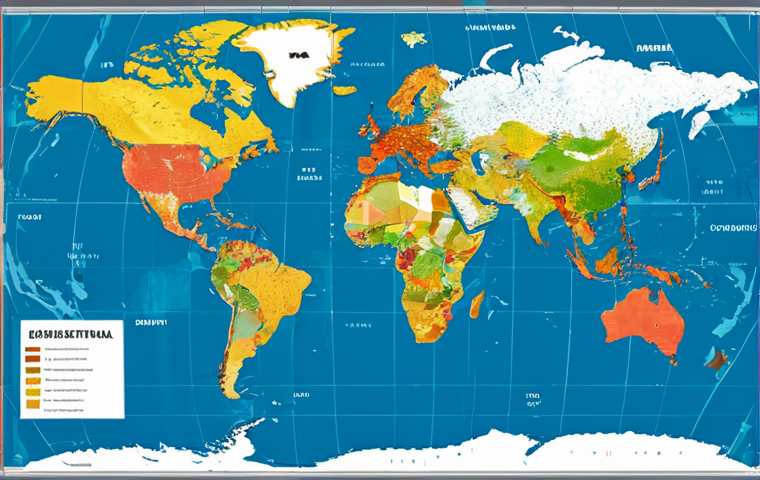
Joint Scientific Expeditions
Data Standardization and Sharing
Building a Unified Front: Establishing Common Goals
Climate Change: A Shared Threat Demanding a Unified Response
Climate change is undeniably one of the most pressing threats to our oceans. From rising sea temperatures to ocean acidification, the impacts are far-reaching and devastating.
I’ve seen firsthand the effects of coral bleaching on reefs I used to dive on, and it’s heartbreaking. It’s a stark reminder that we need to act quickly and decisively.
International cooperation is essential to mitigate these effects. This involves sharing knowledge on climate modeling, developing strategies to reduce carbon emissions, and implementing measures to protect vulnerable ecosystems.
It’s like fighting a fire – you need everyone on board to put it out effectively. It involves not just the scientific community, but also governments, industries, and individuals, all working together to achieve a common goal.
Reducing Emissions: A Global Responsibility
Investing in Renewable Energy
Promoting Sustainable Transportation
Climate Change Education
Adapting to Change: Protecting Vulnerable Ecosystems
Sustainable Fisheries Management: A Collective Responsibility
Overfishing is a rampant problem that threatens marine biodiversity and the livelihoods of countless communities. When I traveled to a small fishing village in Southeast Asia, the fishermen told me how their catches had dwindled over the years due to unsustainable fishing practices by larger industrial fleets.
This made it clear to me that we need a global approach to fisheries management. This means establishing international agreements to regulate fishing quotas, combat illegal fishing, and promote sustainable fishing practices.
It’s about ensuring that future generations can also benefit from the ocean’s resources. We need to manage fisheries collectively, using science-based approaches and prioritizing the health of the ecosystem.
It’s like managing a shared bank account – if you overspend, everyone suffers.
Combating Illegal Fishing: A Coordinated Effort
Strengthening Enforcement Mechanisms
Utilizing Technology for Monitoring
Promoting Traceability
Setting and Enforcing Quotas: Balancing Economic Needs with Ecosystem Health
Protecting Marine Biodiversity: A Shared Commitment
The ocean is teeming with life, from microscopic plankton to giant whales. This biodiversity is essential for the health of the ocean ecosystem and provides numerous benefits to humans, including food, medicine, and recreational opportunities.
Protecting marine biodiversity requires international cooperation to establish marine protected areas, combat pollution, and prevent the introduction of invasive species.
I remember volunteering on a project to remove invasive seaweed from a coral reef in the Caribbean, and it was a real eye-opener to see how quickly these invaders could take over and destroy native habitats.
International collaboration is key to preventing these types of ecological disasters. It’s akin to a community garden where everyone chips in to keep the garden thriving, ensuring a beautiful and bountiful harvest for all.
Establishing Marine Protected Areas: Creating Safe Havens
Collaborative Management of Transboundary MPAs
Ensuring Effective Enforcement
Combating Pollution: Reducing Our Impact
Ocean Acidification: An Emerging Threat Requiring Joint Action
Ocean acidification, caused by the absorption of excess carbon dioxide from the atmosphere, is a growing threat to marine life, particularly shellfish and coral reefs.
I was shocked when I read about studies showing how ocean acidification is making it harder for oysters to form their shells. It’s like the ocean is slowly becoming more acidic, dissolving the very foundations of the marine ecosystem.
International cooperation is needed to monitor ocean acidification, research its impacts, and develop strategies to mitigate its effects. This includes reducing carbon emissions and exploring potential solutions like ocean alkalinization.
It’s comparable to everyone working together to maintain the pH balance of a giant aquarium.
Monitoring and Research: Understanding the Impacts
Standardizing Data Collection
Sharing Research Findings
Mitigation Strategies: Reducing CO2 Emissions
Technology and Innovation: Driving Progress Through Shared Expertise
Advances in technology are providing new tools for ocean exploration, monitoring, and conservation. From satellite imaging to underwater drones, these technologies can help us better understand the ocean and address the challenges it faces.
International collaboration is essential to share these technologies and expertise, particularly with developing countries. When I attended a conference on ocean technology, I saw how researchers from different countries were using drones to map coral reefs in unprecedented detail.
It was inspiring to see how technology could be used to protect these valuable ecosystems. This collaborative effort is akin to a global network of skilled technicians all working together to repair and maintain a vital piece of machinery.
Sharing Technological Advancements: Bridging the Gap
Capacity Building and Training Programs
Open-Source Data Platforms
Collaborative Research and Development: Fostering Innovation
Ocean Governance: Establishing a Framework for Cooperation
Effective ocean governance is essential to ensure that the ocean is managed sustainably and equitably. This involves establishing international laws and agreements to regulate activities such as fishing, shipping, and mining.
It also requires strengthening international institutions and promoting transparency and accountability. I remember studying the history of international maritime law and being impressed by how countries have been able to come together to create rules that govern the use of the ocean.
It’s like developing a comprehensive set of rules and guidelines for a global game, ensuring fair play and preventing any single player from exploiting the system for their own gain.
Strengthening International Institutions: Building Capacity
Promoting Transparency and Accountability
Ensuring Effective Enforcement
Harmonizing National Laws: Creating a Level Playing Field
Here’s a table summarizing some key areas of international collaboration in oceanography:
| Area of Collaboration | Challenges | Solutions | Benefits |
|---|---|---|---|
| Climate Change Mitigation | Political barriers, economic constraints | Joint research, emission reduction targets | Reduced climate impacts, healthier ecosystems |
| Sustainable Fisheries Management | Overfishing, illegal fishing | Quotas, monitoring, enforcement | Sustainable fish stocks, food security |
| Marine Biodiversity Conservation | Habitat destruction, pollution | MPAs, pollution control, invasive species management | Healthy ecosystems, protected species |
| Ocean Acidification Research | Limited data, lack of awareness | Monitoring, research, mitigation | Improved understanding, targeted solutions |
| Technology Sharing | Unequal access, lack of capacity | Training, open-source platforms | Increased innovation, effective solutions |
Funding and Investment: Ensuring Long-Term Sustainability
Sustained international collaboration in oceanography requires adequate funding and investment. This means allocating resources to support research, monitoring, and conservation efforts.
It also requires creating innovative financing mechanisms, such as debt-for-nature swaps and blue bonds. I remember attending a conference where a representative from a small island nation talked about how they were using blue bonds to finance marine conservation projects.
It was a great example of how innovative financing can help protect the ocean. Securing adequate funding is akin to providing the necessary fuel and resources to keep a complex and vital global operation running smoothly.
Mobilizing Resources: Attracting Investment
Public-Private Partnerships
Innovative Financing Mechanisms
Prioritizing Ocean Research: Investing in Knowledge
Navigating the complexities of our oceans requires a collective commitment, and international cooperation is not just an option, it’s a necessity. By pooling resources, sharing knowledge, and establishing common goals, we can tackle the pressing challenges facing our oceans and ensure a sustainable future for generations to come.
It’s a shared voyage, and we’re all in the same boat, striving towards a healthier and more resilient ocean.
Wrapping Up
As we navigate the vast expanse of ocean conservation, it’s clear that collaboration is our strongest current. Let’s commit to working together, across borders and disciplines, to safeguard our oceans. After all, a healthy ocean means a healthy planet for all of us.
Remember, every small action, when multiplied by billions, can create a tidal wave of positive change.
Here’s to a future where our oceans thrive, and our collective efforts reflect the beauty and power they hold.
Useful Information
1. NOAA Fisheries: For up-to-date information on sustainable fishing practices and regulations in the U.S., visit the National Oceanic and Atmospheric Administration (NOAA) Fisheries website.
2. EPA’s Ocean and Coastal Protection: Learn about the Environmental Protection Agency’s (EPA) efforts to protect oceans and coastal areas from pollution and other threats.
3. World Wildlife Fund (WWF) Ocean Conservation: Explore WWF’s global initiatives focused on marine conservation, including protecting marine species and habitats.
4. Ocean Conservancy: Discover ways to get involved in ocean cleanup efforts and advocate for policies that protect our oceans.
5. Monterey Bay Aquarium Seafood Watch: Use this guide to make informed choices about seafood, ensuring you’re supporting sustainable fisheries.
Key Takeaways
International collaboration is vital for tackling global ocean challenges. Resource pooling and joint research efforts are essential for effective solutions. A unified approach to climate change, sustainable fisheries management, and biodiversity protection is necessary. Technology sharing and capacity building are crucial for bridging gaps and fostering innovation. Strong ocean governance and adequate funding are critical for long-term sustainability.
Frequently Asked Questions (FAQ) 📖
Q: Why is international collaboration so crucial in oceanography?
A: Honestly, the ocean’s so vast and interconnected, no single country can tackle its problems alone. Think about it: pollution from a factory in China can end up affecting coral reefs off the coast of Australia.
Climate change, overfishing, plastic pollution – these are global issues that demand a global response. It’s like trying to fix a leaky faucet with just one wrench when you need a whole toolbox of international cooperation.
Sharing data, research, and resources is the only way we’ll truly understand and protect our oceans.
Q: What are some specific examples of how international collaboration helps ocean conservation?
A: Well, I’ve seen firsthand how joint research expeditions can unlock incredible discoveries about marine life and ocean currents. For instance, scientists from the US and Europe worked together on a project mapping the deep-sea floor, revealing previously unknown hydrothermal vents teeming with unique species.
Also, international agreements like the UN Convention on the Law of the Sea help establish rules for fishing and resource management in international waters, preventing overexploitation.
It’s all about creating a framework where countries work together instead of against each other.
Q: What happens if international collaboration in oceanography breaks down?
A: If countries start going their own way and ignore international agreements, we’re heading for disaster. Imagine a scenario where everyone’s just grabbing resources without any regard for sustainability – overfishing would wipe out entire populations, pollution would run rampant, and fragile ecosystems would collapse.
It’s like a free-for-all at a buffet, but with the ocean’s limited resources as the main course. Ultimately, a lack of collaboration means a less healthy, less productive ocean, which impacts everything from global food security to climate regulation.
And trust me, nobody wants that.
📚 References
Wikipedia Encyclopedia
